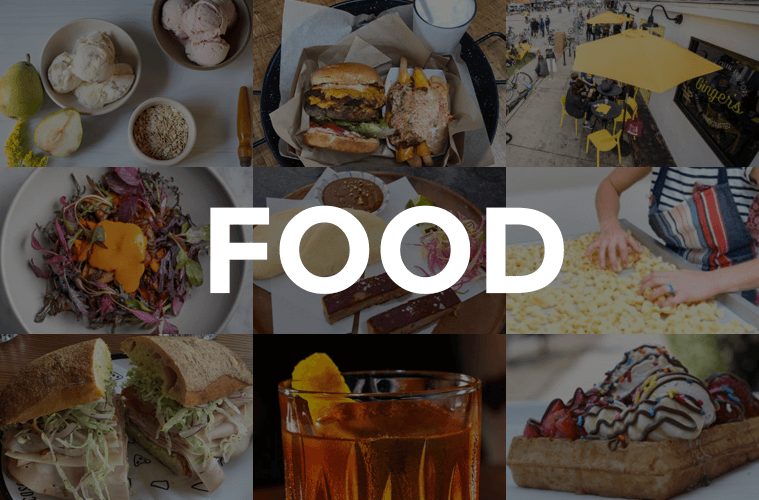Photos by Anne FishbeinIf your idea of a Moroccan meal includes belly-dancing, silk pillows and the sensuous wail of the oud, the Fairfax-district restaurant Chameau may not be for you. Instead of exotic ululations (or even rai ballads), there is the kind of subdued house music you hear in the better hotel lobbies; instead of gardens of earthly delights, there is the hyperdesigned vibe of an after-hours lounge in Paris or lower Manhattan: Islamic-influenced screens, atomic-age swivel chairs, and light fixtures covered in striped, primary-colored fabric. Silhouettes of camels are everywhere, punched into the metal screens between booths, splashed on the walls, even stenciled in powdered sugar onto the b’stilla. A hairy slit across the ceiling is supposed to represent a camel’s eyelash, although hairy slits being what they are, you may come to your own conclusions. The stenciled Moroccan plates, glasses and teapots are more chic than kitsch.
Anise-scented Moroccan flatbread appears on the table with a trio of dips — pureed eggplant, spiced olives and salted lemons — that are refilled as often as you deplete them. The wine list is rich in sturdy California wines, as well as some less than wonderful Moroccan vintages. The appetizers run more to things like wild-mushroom soup and saffron-laced steamed mussels than to the clammy dishes of spiced carrots and deli-style chopped salads that you find at some other Moroccan restaurants in town.
Like the city of Brasilia, a Lapidus hotel or Edward Durrell Stone’s American Embassy in New Delhi, Chameau has a kind of cool that seems to be intensified by the baroquely modernist style now 50 years out of favor.
The man from Morocco
Chef Adel Chagan
Before the restaurant moved last year, Chameau existed as a smallish Silver Lake café, known for chef Adel Chagar’s whimsical dishes of grilled merguez sausage with chickpea fries, and seared sardines rubbed with the cumin-infused herb paste charmoula, but was possibly more notorious for its erratic hours, the absence of alcohol, and prices that seemed staggeringly high on a block with hair salons and a steroid-soaked weight-lifting gym. But it may have taken the move to bring Chagar and Chameau into their own.
On its Web site, Chameau describes itself as a French-Moroccan restaurant, but the food is quite different from both the plain cooking you’ll find at either the fashionable couscous slingers in Paris’ Marais and the new-style cuisine you’ll find in the restaurants of French chefs who happen to feature cumin, argan oil and a tagine or two on their menus. Chagar’s flavors may be modern, lightened, fresh, but his techniques, many of them, tend to come from the traditional Moroccan kitchen, where the pace is fairly languid — at least as described by Paula Wolfert, whose cookbooks are as evocative as any Paul Bowles novel.
So where nine out of 10 restaurant versions of b’stilla, a Moroccan pie of poultry, eggs and spices enclosed in a flaky crust, will be made with bought filo or strudel pastry, Chagar’s version is made with the traditional warka, crisp leaves made by tapping balls of flour and water onto a hot surface and then peeling off the thin membranes of cooked dough with one’s fingernails. If you haven’t made warka before, it can take an entire afternoon to come up with enough usable pastry for a single b’stilla, although you will certainly have fled for the safety of frozen filo long before then. It is something of a miracle to come across the real thing, thin as gauze and nearly transparent, stacked above and below the steamy, savory filling of duck, almonds and eggs as if it comprised merely the bread of a sandwich instead of a finely tuned etude in crunch.
The warka makes another appearance at dessert, where it is wrapped around an unconventional version of a Moroccan dessert called “the snake,’’ stuffed with chocolate and caramel as well as the traditional ground almonds, and as the crust of a dessert b’stilla filled with berries and ice cream.
Couscous too is a substance easy enough to come up with out of a box, but Chagar’s house-made couscous, made by rubbing different grinds of semolina together with a little water, is amazing stuff, moist and fluffy, delicately flavored, so light that it takes on the quality of perfumed air when it is steamed over broth. Chameau’s lamb shoulder tagine is a delicious, dense stew, cooked until the meat almost dissolves into a kind of lamb-scented cloud, and the roasted lamb shank with quince is beautifully done, but the meat dishes may be basically excuses to get your hands on a big mound of that couscous and maybe a dab of the fiery harissa sauce — which is really all you need.
Chameau, 339 N. Fairfax Ave., (323) 951-0039. Open Tues.–Sun., 6–10 p.m. AE, D, DC, MC, V. Beer and wine. Street parking. Dinner for two, food only, $42–$66. Recommended dishes: duck b’stilla, lamb shoulder tagine.
Advertising disclosure: We may receive compensation for some of the links in our stories. Thank you for supporting LA Weekly and our advertisers.

